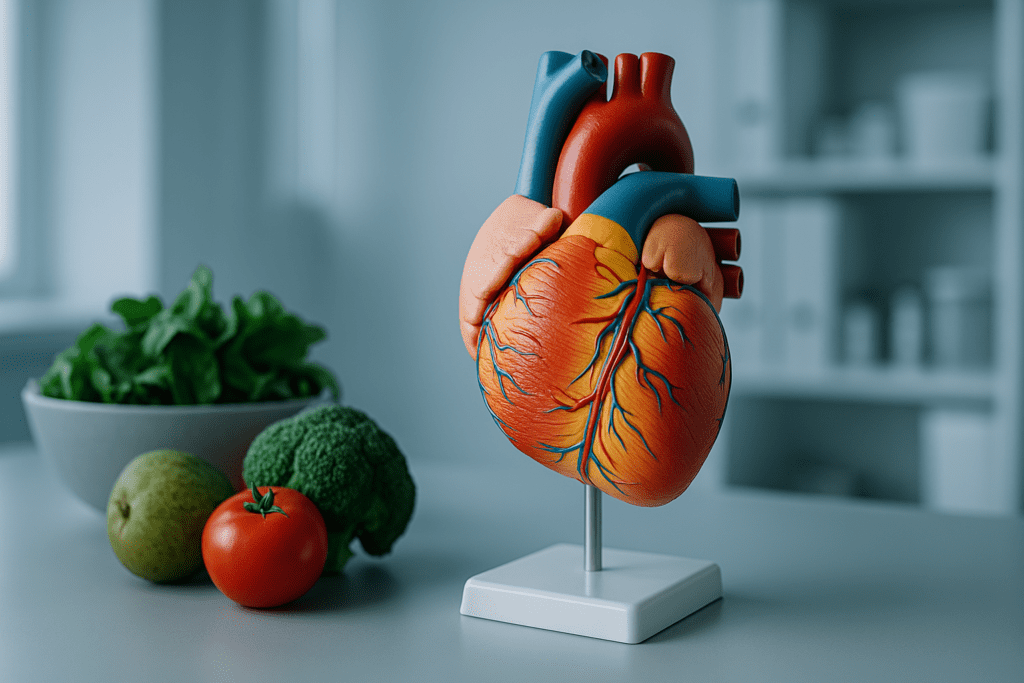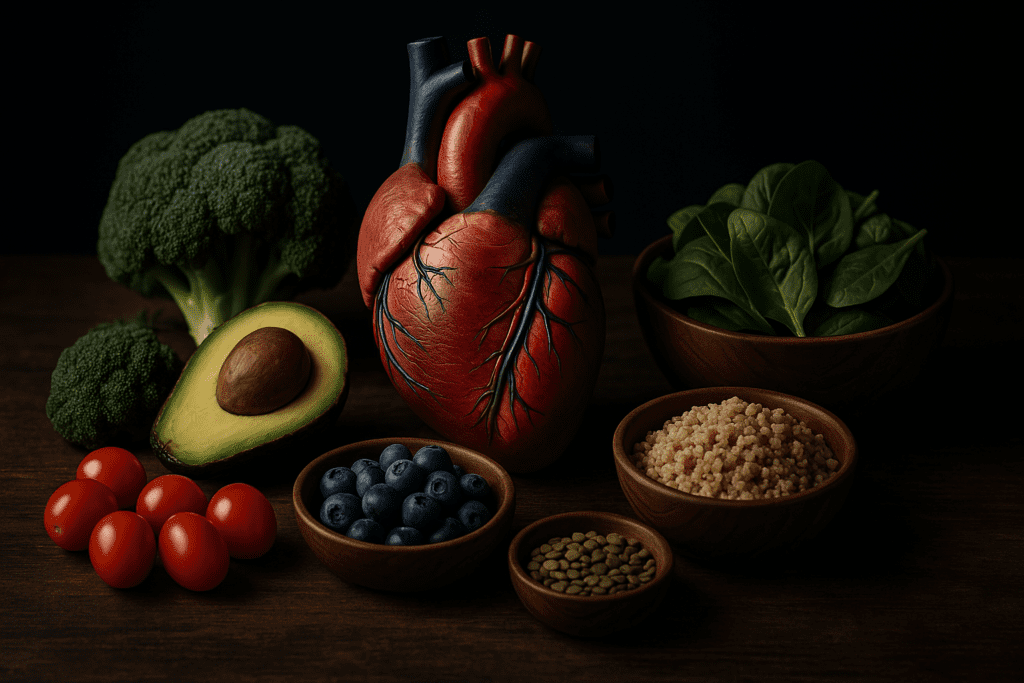Heart disease and stroke remain two of the leading causes of death worldwide, with millions of people experiencing these life-threatening events each year. While advancements in modern medicine have improved outcomes, prevention remains the most effective strategy for long-term heart health. Emerging evidence suggests that adopting a whole-food, plant-based diet is one of the most powerful ways to prevent stroke and heart attack. By focusing on nutrient-dense, fiber-rich, and minimally processed foods, individuals can significantly reduce their risk of coronary artery disease, hypertension, and other cardiovascular conditions. Understanding how to prevent stroke and heart attack through diet involves more than just avoiding unhealthy foods—it requires embracing a lifestyle that supports vascular health, reduces inflammation, and improves cholesterol levels.
This article explores how a whole-food, plant-based diet can be a game-changer in preventing heart disease and stroke. Drawing on cutting-edge research and expert recommendations, we will uncover the science behind plant-based nutrition, highlight its cardiovascular benefits, and provide actionable tips for adopting this heart-protective lifestyle. If you’re wondering how to avoid a heart attack or stroke or how to not have a heart attack, this comprehensive guide offers evidence-based insights to help you make informed decisions and safeguard your long-term health.
You may also like: How a Plant-Based Diet May Help Reduce Cancer Risk: What Science Says About Nutrition and Tumor Prevention
Understanding the Link Between Diet and Cardiovascular Disease
Cardiovascular disease, which includes heart attacks and strokes, is largely influenced by lifestyle factors such as diet, physical activity, and smoking. One of the most common underlying causes of these conditions is atherosclerosis, a process characterized by the buildup of plaque in the arteries. Over time, this plaque can narrow the arteries, restrict blood flow, and lead to blood clots that trigger heart attacks or strokes. While genetic predisposition can play a role, lifestyle choices, particularly diet, have a profound impact on the progression of atherosclerosis and the risk of cardiovascular events.
A diet high in saturated fats, trans fats, and refined sugars can accelerate the development of plaque, increasing the likelihood of coronary artery disease. In contrast, a whole-food, plant-based diet is rich in antioxidants, fiber, and anti-inflammatory compounds that protect against arterial damage and promote overall heart health. Numerous studies have shown that plant-based diets can significantly reduce cholesterol levels, lower blood pressure, and improve endothelial function, all of which contribute to a reduced risk of heart disease. For those seeking how to avoid coronary artery disease or how can coronary artery disease be prevented, shifting to a plant-based lifestyle can be a powerful step toward achieving these goals.

How a Whole-Food Plant-Based Diet Protects the Heart
Reducing Inflammation and Oxidative Stress
Chronic inflammation and oxidative stress play a pivotal role in the development of cardiovascular disease. Processed foods, refined carbohydrates, and saturated fats can trigger inflammatory pathways, leading to endothelial dysfunction and arterial damage. In contrast, whole plant foods such as fruits, vegetables, legumes, and whole grains are rich in antioxidants and phytochemicals that neutralize free radicals and reduce inflammation.
A diet abundant in colorful fruits and vegetables provides an array of antioxidants, including vitamin C, beta-carotene, and polyphenols, which combat oxidative stress and protect the arterial lining. Studies have shown that individuals who consume a diet high in antioxidants experience a lower risk of heart attacks and strokes, reinforcing the importance of plant-based nutrition for vascular health.
Lowering Cholesterol Levels Naturally
Elevated cholesterol, particularly low-density lipoprotein (LDL) cholesterol, is a major contributor to plaque formation in the arteries. Saturated fats from animal products and processed foods can elevate LDL levels, increasing the risk of coronary artery disease. Conversely, a whole-food, plant-based diet is naturally low in saturated fat and free of cholesterol, making it an effective strategy for lowering LDL levels.
Soluble fiber found in oats, legumes, flaxseeds, and fruits binds to cholesterol in the digestive tract, preventing its absorption and promoting its excretion. Regular consumption of fiber-rich foods has been shown to lower LDL cholesterol by as much as 10-15%, reducing the risk of heart attacks and strokes. For those wondering how to prevent a heart attack in 10 seconds, while no quick fix exists, adopting a fiber-rich plant-based diet is a sustainable and proven method for lowering cholesterol and improving heart health over time.

Improving Blood Pressure and Vascular Function
High blood pressure, or hypertension, is a leading risk factor for both stroke and heart attack. Excess sodium, coupled with insufficient potassium, contributes to increased blood pressure, straining the heart and damaging blood vessels. A whole-food, plant-based diet emphasizes potassium-rich foods such as leafy greens, bananas, and sweet potatoes while minimizing sodium intake from processed foods.
The DASH (Dietary Approaches to Stop Hypertension) diet, which emphasizes fruits, vegetables, and whole grains, has been shown to lower blood pressure significantly. Plant-based diets go a step further by eliminating animal products, further enhancing vascular function and reducing blood pressure. Studies have demonstrated that individuals following a plant-based diet experience an average reduction in systolic blood pressure by 5-10 mmHg, making it a powerful tool for how to avoid a heart attack or stroke through natural means.

The Role of Plant-Based Nutrition in Preventing Stroke
Enhancing Cerebral Blood Flow
A stroke occurs when blood flow to the brain is interrupted, often due to a blood clot or hemorrhage. Maintaining optimal blood flow to the brain is essential for stroke prevention, and a plant-based diet supports this by improving endothelial function and reducing arterial stiffness. Nitric oxide, produced by the endothelial cells lining the blood vessels, plays a critical role in vasodilation, allowing blood to flow freely.
Leafy greens, beets, and citrus fruits are rich in nitrates that enhance nitric oxide production, promoting healthy blood flow and reducing the risk of ischemic stroke. Studies have shown that individuals who consume nitrate-rich vegetables have better vascular function and a lower incidence of stroke, reinforcing the protective effects of plant-based nutrition.
Preventing Blood Clot Formation
Blood clots that block arteries can lead to ischemic strokes, the most common type of stroke. Platelets, which play a role in clot formation, can become overly reactive in response to inflammation and oxidative stress. Plant-based diets, which are naturally anti-inflammatory, reduce platelet aggregation and minimize the risk of clot formation.
Omega-3 fatty acids, found in flaxseeds, chia seeds, and walnuts, further support cardiovascular health by reducing inflammation and preventing abnormal clotting. Incorporating these foods into a plant-based diet provides an added layer of protection against stroke, making them essential for anyone seeking how to prevent stroke and heart attack through dietary choices.
Practical Strategies for Transitioning to a Whole-Food Plant-Based Diet
Start with Small, Sustainable Changes
Transitioning to a whole-food, plant-based diet does not have to happen overnight. Begin by incorporating more fruits, vegetables, legumes, and whole grains into your meals while gradually reducing animal products and processed foods. Experiment with plant-based versions of familiar dishes, such as lentil soups, vegetable stir-fries, and grain bowls, to ease the transition and discover new flavors.
Focus on Nutrient Density and Variety
To ensure optimal nutrition, prioritize a variety of nutrient-dense plant foods that provide essential vitamins, minerals, and antioxidants. Incorporate a rainbow of fruits and vegetables to maximize phytonutrient intake and support overall health. Legumes, nuts, seeds, and whole grains offer ample protein, fiber, and healthy fats, ensuring balanced nutrition on a plant-based diet.
Minimize Processed and Refined Foods
While a plant-based diet emphasizes whole foods, it is essential to minimize processed plant-based products that may be high in added sugars, sodium, and unhealthy fats. Opt for minimally processed foods such as fresh produce, whole grains, and legumes to reap the full cardiovascular benefits of plant-based eating. Reading ingredient labels and avoiding ultra-processed foods can help maintain the integrity of a heart-healthy diet.
Addressing Common Concerns About Plant-Based Diets
Protein Intake and Muscle Maintenance
One of the most common misconceptions about plant-based diets is that they lack sufficient protein for muscle maintenance and overall health. However, legumes, lentils, quinoa, tofu, tempeh, and nuts provide ample protein, with all essential amino acids when consumed in variety. Athletes and active individuals can meet their protein needs through strategic meal planning and by incorporating protein-rich plant foods into their daily routine.
Vitamin B12 and Omega-3 Supplementation
Vitamin B12, which is primarily found in animal products, is essential for nerve function and red blood cell production. Those following a plant-based diet should consider fortified foods or supplements to meet their B12 needs. Similarly, omega-3 fatty acids, crucial for heart and brain health, can be obtained from flaxseeds, chia seeds, and walnuts, though some individuals may benefit from an algae-based DHA supplement.
Long-Term Benefits of a Whole-Food Plant-Based Diet for Heart Health
Sustained Weight Management
Maintaining a healthy weight is a key component of preventing heart disease and stroke. Whole, plant-based foods are naturally lower in calories and higher in fiber, promoting satiety and preventing overeating. Individuals following a plant-based diet often experience sustained weight loss and improved metabolic health, further reducing their cardiovascular risk.
Reduced Risk of Chronic Diseases
In addition to heart disease and stroke, plant-based diets have been linked to a lower risk of type 2 diabetes, hypertension, and certain cancers. The anti-inflammatory and antioxidant properties of plant foods contribute to overall disease prevention and longevity, making a whole-food, plant-based diet a cornerstone of preventive healthcare.
Enhanced Longevity and Quality of Life
A plant-based lifestyle not only reduces the risk of life-threatening conditions but also enhances overall quality of life. Improved energy levels, better digestion, and a stronger immune system are among the many benefits reported by individuals who embrace plant-based nutrition. By preventing chronic diseases and promoting vitality, a plant-based diet supports long-term well-being and longevity.
Frequently Asked Questions (FAQ): How to Prevent Stroke and Heart Attack with a Whole-Food Plant-Based Diet
1. How can a whole-food, plant-based diet help lower the risk of coronary artery disease?
A whole-food, plant-based diet can significantly reduce the risk of coronary artery disease (CAD) by addressing the root causes of atherosclerosis. This diet emphasizes nutrient-dense foods such as fruits, vegetables, legumes, and whole grains, which are rich in fiber, antioxidants, and phytonutrients that help reduce inflammation and oxidative stress. Soluble fiber in foods like oats, beans, and flaxseeds binds to cholesterol in the digestive system, promoting its excretion and lowering LDL cholesterol levels. Additionally, plant-based diets improve endothelial function, allowing blood vessels to dilate properly and enhancing overall circulation. For individuals wondering how to avoid coronary artery disease, adopting a plant-based diet is a scientifically supported strategy that targets multiple risk factors simultaneously, offering long-term protection against heart disease.
2. Is there really a 7-second trick to prevent heart attack?
The idea of a 7 second trick to prevent heart attack is a common myth circulating online, often suggesting that a quick action can prevent a heart attack. While there is no single action that can guarantee immediate prevention, adopting long-term lifestyle changes can dramatically reduce heart attack risk. Regularly consuming a whole-food, plant-based diet is one of the most effective strategies for preventing heart attacks by reducing inflammation, lowering cholesterol, and improving vascular health. Additionally, practicing mindfulness and stress reduction techniques such as deep breathing or progressive muscle relaxation can help manage acute stress, which is a known trigger for heart attacks. Although there may be no 7 second trick to prevent heart attack, consistent commitment to heart-healthy habits can provide lasting protection.
3. Can plant-based diets improve blood pressure and reduce stroke risk?
Yes, a whole-food, plant-based diet can have a profound impact on lowering blood pressure, which is a major risk factor for stroke. Potassium-rich foods such as spinach, bananas, and sweet potatoes help balance sodium levels in the body, reducing the strain on blood vessels and lowering blood pressure. Nitric oxide-boosting foods like beets and leafy greens improve endothelial function, allowing blood vessels to relax and promoting better blood flow. Studies have shown that individuals following a plant-based diet experience significant reductions in systolic and diastolic blood pressure over time. For those seeking how to prevent stroke and heart attack, focusing on plant-based nutrition provides a natural and effective means of reducing vascular stress and maintaining optimal blood pressure levels.
4. How can coronary artery disease be prevented beyond diet?
In addition to adopting a whole-food, plant-based diet, several other lifestyle modifications can further reduce the risk of coronary artery disease. Regular physical activity, such as brisk walking, swimming, or cycling, strengthens the heart and improves circulation, reducing the risk of plaque buildup in the arteries. Stress management techniques, including mindfulness meditation and yoga, help lower cortisol levels and prevent chronic inflammation, which contributes to arterial damage. Adequate sleep, typically 7-9 hours per night, supports cardiovascular health by allowing the body to repair and regulate blood pressure. Avoiding smoking and minimizing alcohol consumption are also critical factors in preventing CAD. For individuals seeking how can coronary artery disease be prevented, integrating these lifestyle practices with a plant-based diet enhances overall heart health and longevity.
5. Are there quick ways to prevent a heart attack in 10 seconds or less?
While the concept of how to prevent a heart attack in 10 seconds is misleading, there are immediate steps that can be taken in emergency situations to minimize damage. If experiencing chest pain, shortness of breath, or discomfort in the arms or jaw, chewing an aspirin can help thin the blood and reduce clot formation, potentially preventing further blockage. However, this is not a preventive measure but rather an emergency response. For long-term prevention, a plant-based diet, regular exercise, and stress management remain the most effective strategies. People interested in how to prevent a heart attack in 10 seconds should focus on building sustainable habits that address cardiovascular risk factors over time rather than relying on quick fixes.
6. How does a plant-based diet reduce inflammation linked to heart attacks?
Chronic inflammation is a key driver of atherosclerosis and plaque formation, which increases the risk of heart attacks and strokes. A whole-food, plant-based diet naturally reduces inflammation by eliminating pro-inflammatory foods such as processed meats, refined sugars, and trans fats. Anti-inflammatory compounds found in fruits, vegetables, and legumes, such as polyphenols and flavonoids, neutralize free radicals and prevent oxidative stress. Omega-3 fatty acids from sources like flaxseeds and chia seeds further help modulate the body’s inflammatory response. By addressing inflammation at its core, plant-based nutrition provides a powerful defense against heart disease for those wondering how to not have a heart attack and improve overall cardiovascular health.
7. How can I transition to a plant-based diet without feeling overwhelmed?
Transitioning to a plant-based diet can be achieved by taking small, manageable steps that gradually replace animal products with whole plant foods. Start by incorporating more plant-based meals into your weekly routine, experimenting with simple dishes such as lentil soups, vegetable stir-fries, and grain bowls. Explore a variety of legumes, whole grains, and leafy greens to diversify your nutrient intake and keep meals interesting. To ensure a smooth transition, stock your pantry with plant-based staples and explore creative plant-based versions of your favorite dishes. For those curious about how to avoid a heart attack or stroke through dietary changes, adopting a gradual and sustainable approach can make the process enjoyable and sustainable over the long term.
8. Are there specific foods that help prevent blood clots and strokes?
Yes, certain foods can naturally reduce the risk of blood clots, which are a leading cause of stroke. Leafy greens, beets, and citrus fruits contain nitrates that improve endothelial function and enhance blood flow, reducing the likelihood of clot formation. Omega-3-rich foods such as walnuts, flaxseeds, and chia seeds help prevent abnormal platelet aggregation, reducing the risk of thrombosis. Additionally, ginger and turmeric possess natural antiplatelet properties that support healthy circulation. Incorporating these foods into a plant-based diet provides an extra layer of protection for those looking to learn how to prevent stroke and heart attack through nutrition and lifestyle modifications.
9. How does stress affect heart health, and how can it be managed effectively?
Chronic stress is a significant risk factor for heart disease, contributing to high blood pressure, inflammation, and unhealthy coping behaviors such as overeating or smoking. Stress triggers the release of cortisol, which, over time, can weaken the cardiovascular system and increase the likelihood of plaque formation in the arteries. Effective stress management techniques include mindfulness meditation, progressive muscle relaxation, and deep breathing exercises that activate the parasympathetic nervous system, promoting relaxation. Engaging in regular physical activity and maintaining social connections also helps mitigate the harmful effects of stress. For those exploring how to not have a heart attack, managing stress effectively is a critical component of overall heart health.
10. Is it possible to reverse coronary artery disease with a plant-based diet?
Yes, emerging research suggests that a whole-food, plant-based diet has the potential to not only prevent but also reverse coronary artery disease in some cases. Studies led by Dr. Dean Ornish and Dr. Caldwell Esselstyn have shown that individuals who adopt a low-fat, plant-based diet can experience regression of atherosclerosis, with improved blood flow and reduced plaque buildup. This reversal is attributed to the anti-inflammatory and cholesterol-lowering effects of plant-based nutrition, which help restore endothelial function and prevent further damage. While reversal may not be possible in all cases, adhering to a plant-based diet significantly improves overall cardiovascular health for those seeking how to avoid coronary artery disease and achieve long-term heart health.
Conclusion: Empowering Yourself to Prevent Stroke and Heart Attack with Plant-Based Nutrition
Adopting a whole-food, plant-based diet is one of the most effective strategies for how to prevent stroke and heart attack and achieve long-term heart health. By reducing inflammation, lowering cholesterol levels, and improving blood pressure, plant-based nutrition addresses the root causes of cardiovascular disease and offers lasting protection. For those seeking how to avoid a heart attack or stroke, the evidence is clear—whole, plant-based foods provide a powerful defense against heart disease and stroke.
While there is no 7 second trick to prevent heart attack or how to prevent a heart attack in 10 seconds, the consistent adoption of plant-based nutrition can yield profound benefits over time. Small, incremental changes toward a plant-based lifestyle can lead to significant improvements in heart health, empowering individuals to take control of their well-being and prevent life-threatening events. As research continues to underscore the importance of diet in preventing cardiovascular disease, there has never been a better time to embrace the heart-protective power of plant-based nutrition.
heart disease prevention, cardiovascular health tips, plant-based diet for heart health, prevent heart attack naturally, stroke prevention strategies, anti-inflammatory foods for heart health, lowering cholesterol with diet, improve blood circulation naturally, foods that reduce blood pressure, heart-healthy lifestyle changes, whole-food nutrition for heart, reduce risk of coronary artery disease, managing high blood pressure naturally, arterial plaque prevention, plant-based eating for longevity, omega-3 benefits for heart, reduce inflammation with diet, preventing blood clots naturally, vascular health improvement, reversing heart disease with diet
Further Reading:
Reduce Your Heart Disease Risk With a Plant-based Diet
A Review of Plant-based Diets to Prevent and Treat Heart Failure
Can a plant-based diet ‘reverse’ heart disease?
Disclaimer
The information contained in this article is provided for general informational purposes only and is not intended to serve as medical, legal, or professional advice. While NewsHealthWatch strives to present accurate, up-to-date, and reliable content, no warranty or guarantee, expressed or implied, is made regarding the completeness, accuracy, or adequacy of the information provided. Readers are strongly advised to seek the guidance of a qualified healthcare provider or other relevant professionals before acting on any information contained in this article. NewsHealthWatch, its authors, editors, and contributors expressly disclaim any liability for any damages, losses, or consequences arising directly or indirectly from the use, interpretation, or reliance on any information presented herein. The views and opinions expressed in this article are those of the author(s) and do not necessarily reflect the official policies or positions of NewsHealthWatch.

